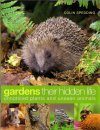![Gardens, their Hidden Life Gardens, their Hidden Life]()
Click to have a closer look
About this book
Contents
Biography
Related titles
About this book
Gardens are most people's main opportunity to see an ecosystem at work. Even the smallest space contains a collection of both wild animals and plants. Yet we are often oblivious of the sheer richness of experience that our gardens can provide. Most of us do not expect to see anything they haven't built or planted. In small gardens, most visiting wildlife will be in the form of birds and butterflies; in more substantial gardens, residents may include larger mammals, but they are mainly nocturnal--and few gardeners look in their gardens after dark. This book explores the garden's hidden world of life amid the grass, behind the bushes, in the trees and under stones and fallen branches and will convert a stroll around your garden from a conversation with familiar friends (the plants chosen and planted) to a voyage of discovery that includes invertebrates and larger animals as well. Broad and inclusive in its approach, this book should appeal to naturalists and gardeners of all ages.
Contents
1. Gardens - their purposes, roles, origins and variety
2. Environment
3. Colour and communication
4. Observing wildlife
5. Cultivated plants
6. Grass
7. Trees and shrubs
8. Fungi, lichens, mosses and ferns
9. Interactions between plants and animals
10. Animal reproduction and parental care
11. Animals that occur all over the garden
12. Residents and visitors
13. Attracting wildlife
14. Ponds, lakes and bog gardens
15. Enemies and friends of the gardener
16. Medicinal plants
17. Cats and dogs in the garden
18. Houses and sheds
19. What's going on in the winter
20. What to look for each month
21. The impact of climate change
22. Studying nature in the garden
Customer Reviews
Biography
Sir Colin Spedding CBE was Pro-Vice Chancellor, Professor of Agricultural Systems and Director of the Centre for Agricultural Strategy at Reading University.With his son, Geoffrey, he co-authored "The Natural History of a Garden" (Timber Press, 2003) about his own garden in Berkshire. Most recently, he has published "What's in Your Garden? A Book for Young Explorers" (Brambley Press, 2010). He has also written widely on agricultural topics and on the animal welfare debate.









































